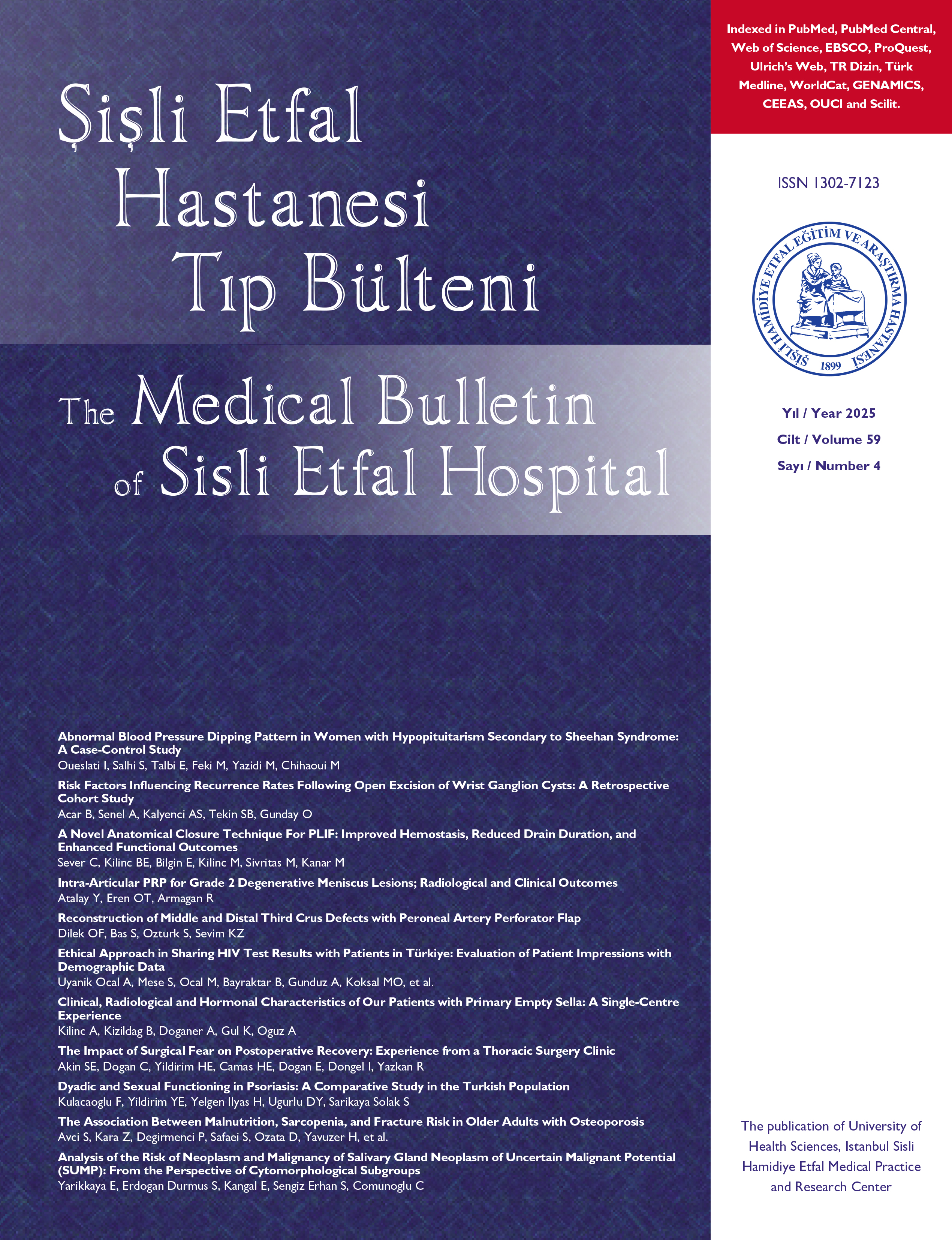
A Cross-Sectional Investigation of Quality of Life in Patients with Polycystic Ovary Syndrome
Atilla Tekin1, Esra Demiryürek2, Engin Çakmak3, Osman Temizkan4, Ömer Akil Özer3, Oğuz Karamustafalıoğlu31Department of Psychology, Halic University, Istanbul, Turkey2Department of Psychiatry, Sakarya University, Sakarya, Turkey
3Department of Psychiatry, Şişli Hamidiye Etfal Training and Research Hospital, İstanbul, Turkey
4Department of Gynaecology and Obstetrics, Şişli Hamidiye Etfal Training and Research Hospital, İstanbul, Turkey
Objectives: The aim of this study is to investigate the effect of physical signs and comorbid psychopathology on quality of life in women with polycystic ovary syndrome (PCOS).
Methods: This cross-sectional study was conducted to assess 84 women with PCOS according to Rotterdam diagnosis criteria. Structured Clinical Interview for DSM-IV Axis 1 Disorders (SCID-I) and the World Health Organization Quality of LifeBrief Form (WHOQOL-BREF) were applied to each participant. The biochemical parameters and physical signs of the participants were evaluated.
Results: A negative correlation was found between hirsutism score and physical, psychological, social, and environmental domains of WHOQOL-BREF (p=0.023, p=0.007, p=0.020, and p=0.033, respectively). Furthermore, a negative correlation was found between body mass index (BMI) and psychological domain of WHOQOL-BREF (p=0.001). Depression was found to be an important predictor for physical, psychological, and social domains of quality of life (p=0.002, p=0.001, and p=0.001, respectively).
Conclusion: Comorbid depression and high BMI and hirsutism scores decrease the quality of life in women with PCOS.
Keywords: Hirsutism, obesity; polycystic ovary syndrome; quality of life.
A cross-sectional investigation of quality of life in patients with polycystic ovary syndrome
Atilla Tekin1, Esra Demiryürek2, Engin Çakmak3, Osman Temizkan4, Ömer Akil Özer3, Oğuz Karamustafalıoğlu31Department of Psychology, Haliç University, İstanbul, Turkey2Department of Psychiatry, Sakarya University, Sakarya, Turkey
3Department of Psychiatry, Şişli Hamidiye Etfal Training and Research Hospital, İstanbul, Turkey
4Department of Gynaecology and Obstetrics, Şişli Hamidiye Etfal Training and Research Hospital, İstanbul, Turkey
Objectives: The aim of this study is to investigate the effect of physical signs and comorbid psychopathology on quality of life in women with polycystic ovary syndrome (PCOS).
Methods: This cross-sectional study was conducted to assess 84 women with PCOS according to Rotterdam diagnosis criteria. Structured Clinical Interview for DSM-IV Axis 1 Disorders (SCID-I) and the World Health Organization Quality of LifeBrief Form (WHOQOL-BREF) were applied to each participant. The biochemical parameters and physical signs of the participants were evaluated.
Results: A negative correlation was found between hirsutism score and physical, psychological, social, and environmental domains of WHOQOL-BREF (p=0.023, p=0.007, p=0.020, and p=0.033, respectively). Furthermore, a negative correlation was found between body mass index (BMI) and psychological domain of WHOQOL-BREF (p=0.001). Depression was found to be an important predictor for physical, psychological, and social domains of quality of life (p=0.002, p=0.001, and p=0.001, respectively).
Conclusion: Comorbid depression and high BMI and hirsutism scores decrease the quality of life in women with PCOS.
Anahtar Kelimeler: hirsutism, obesity, polycystic ovary syndrome, quality of life
Manuscript Language: English



















